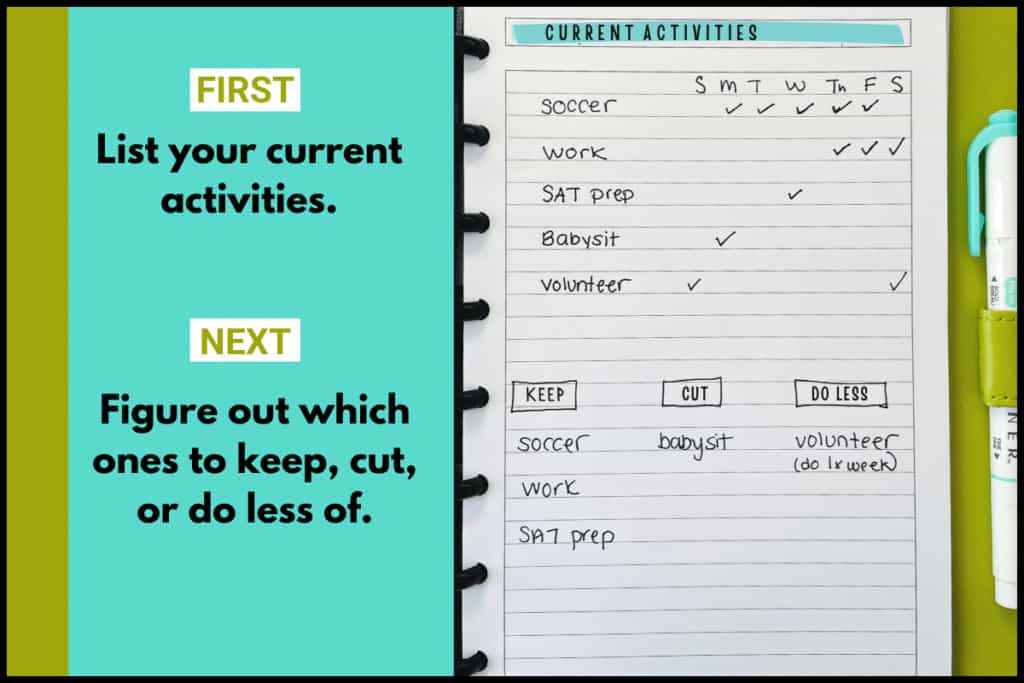
By Katie Azevedo, M.Ed.
Students are often told they need to do a ton of activities in order to create superior transcripts for college applications.
First of all: false. More does not equal more, in the eyes of college admissions officers. Here’s what U.S. News and World Report has to say on that matter.
Furthermore, taking on too many activities – whether school-related or otherwise – can lead to overwhelm and ultimately poor performance across the board. Even worse, doing too much can seriously impact your health, as stress raises cortisol levels, disrupts sleeping patterns, lowers confidence, and exacerbates feelings of depression. Chronic stress is no joke, folks.
Below, I share four telltale signs that you’re doing too much. If you clicked on this title and are reading this article, something about this topic resonated. Perhaps you subconsciously know you’re doing too much and you need someone’s permission to stop. If so, you have my permission to stop trying to do it all.
4 signs you’re doing too much as a student
1. You rarely go to bed feeling “done” for the day.
If you’re constantly feeling like the treadmill is still moving, even when you’re laying in bed, you’re likely doing too much. Sure, some days are going to be busier than others, and naturally they’ll be days when you just run out of time, but these feelings should not be nightly. Most nights, you should go to bed feeling “done” – done in the sense that you could literally put a checkmark next to all your to-do items for the day. If you’re having trouble falling asleep at night because you can’t shut off your brain, read these 10 very important nighttime anxiety strategies.
2. You’re always behind or barely on time for assignments.
If you’re constantly cutting it close with assignment due dates, you might be doing too much. (Watch this 1:30 min video. Seriously, it’s hilarious – but it also sums up what you might be feeling if you’re doing too much.)
Of course, it’s normal to have an occasional day when your history teacher assigns a project the same time your English teacher assigns an essay, in which case you might feel situational overwhelm. But if you constantly feel like for every one assignment you submit, you’re given two more, then it’s time to reevaluate your schedule.
3. You’re starting to forget things.
If you suddenly find yourself forgetting more than usual, you might be overcommitted. I’m talking about forgetting things you have no reason to forget, like basic homework assignments, tests, and important dates outside of school – like work or appointments. If our brains are overwhelmed by stress hormones (cortisol, adrenaline and norepinephrine), our working memory takes a hit. Also, you need to be using an assignment notebook.
4. You have too many actual calendar conflicts.
Assuming you use a calendar (right?!?!), it’s a classic sign that you’re doing too much if you have more than one monthly scheduling conflict. If more than once a month you have two commitments on the same day and time, you’re overcommitted. Do you always have practice on Wednesdays at 3:00, and are also supposed to volunteer twice a month on Wednesdays at 3:00? Then you’re doing too much. Time to make a change.
Solutions: What to do when you’re doing too much
If you are doing too much, the easy answer is simply to do less. In some cases, that’s the REAL answer, as I explain below. But, in some cases it’s not that simple, and I know that. Read on.
1. Do less.
Sometimes you really have to do less. Here’s the process:
- Write a list of all your commitments, other than homework.
- Cross off your top 2 – the two commitments that bring you the most joy and which are non negotiable. You will continue doing these.
- Look at the rest. Move slowly through your list, noting which ones stress you out the most. Which ones give you a pit in your stomach? Cut that from your commitments.
2. Give less.
If you absolutely can’t remove any commitments from your schedule, then look at the list you created above and pick one to three activities that you can give less to. In other words, identify activities can you cut back on (not cut out completely), give less time to, or give less emotional energy to. Mathematically you cannot give 100% to more than one thing. So think about which commitments you can give less of yourself to, while still technically “doing” them.

Consider cutting the ones that stress you out.
3. Be ruthless with time management.
If you’re feeling overwhelmed, are experiencing more than one sign that you’re doing too much, and have already cut what you can from your schedule, then it’s time to be ruthless with your time management skills. Now is when you use your calendar, calendar-block every single day (every single day!), and get real with how you’re really spending your time.
Here are some nitty gritty time management tips to get you started:
- Planning time to study: 3 time management tips for students
- 8 time management tips for students
- How to group tasks to get more done
- How to use the Power Hour as a student

